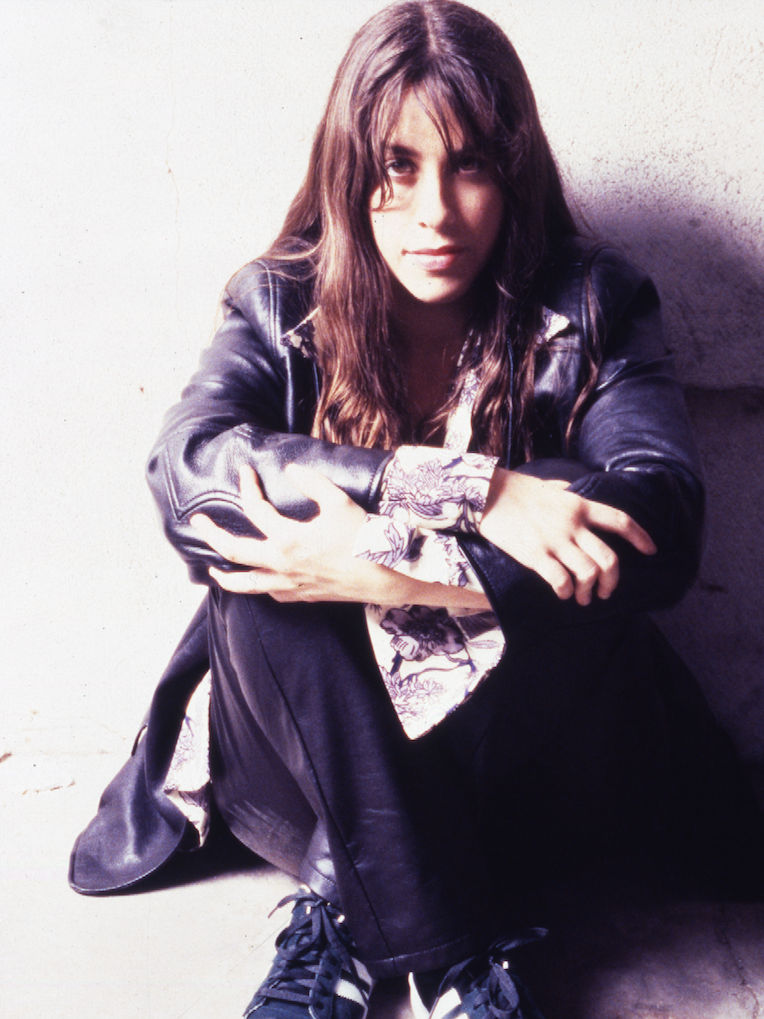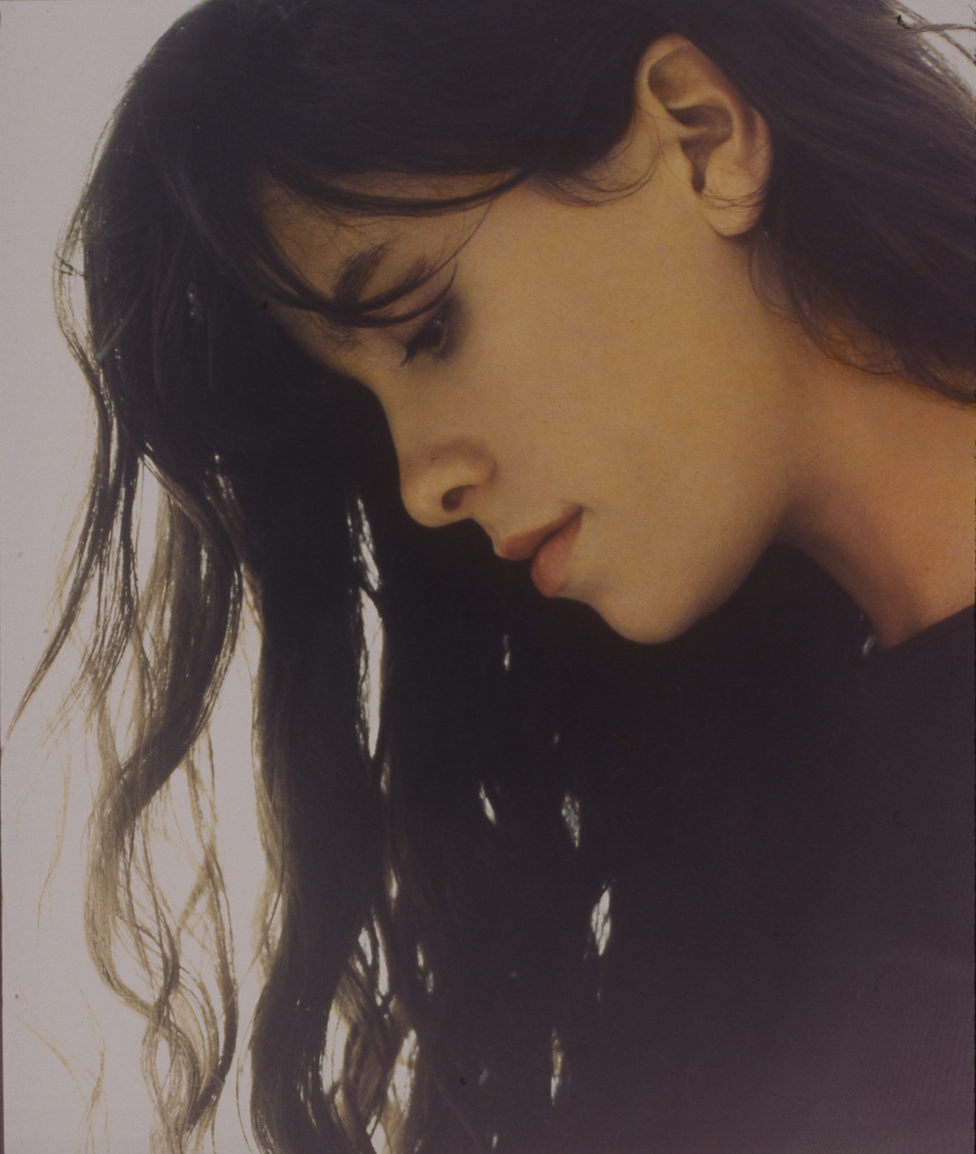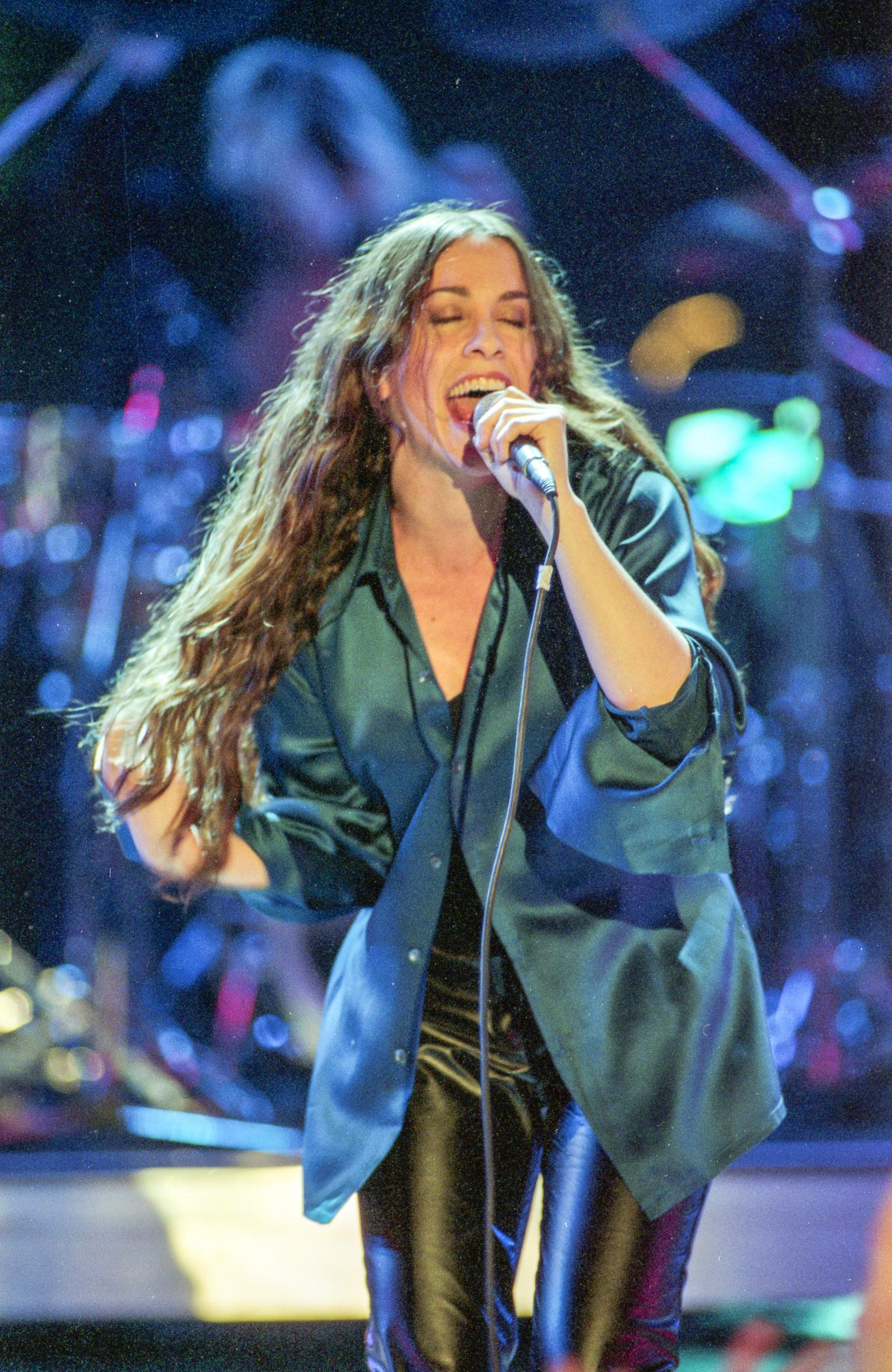Alanis Morissette: ‘I would put guardians around 19-year-old Alanis who weren’t exploiting and using her’
Her 1995 album ‘Jagged Little Pill’ is a pop-rock classic that sold more than 33 million copies worldwide, but she tells Chloe Hubbard, she was not protected as a young artist. She talks about the power of anger, the track she would change and the effect of lockdown on her mental health


I remember when I first got my hands on Jagged Little Pill by Alanis Morissette. It was 1996, and I had it on cassette. Whenever I wanted to listen to the album, I had to open the thing, remove it from its over-loved housing and heavily thumbed inlay card, and jam it into the stereo: creak, clunk, play. When I think of this memory I’m in a car – my best friend Karly’s clapped-out Nissan Micra to be precise. There would be a pause and then the unmistakable jar of the harmonica, before 57 minutes of wailing and headbanging as Morissette covered love, breakups, feminism, exploitation and abuse. It felt edgy, rebellious, raw. We loved her and we knew every word.
Morissette was still a teenager when she set about writing this seminal album. She’s soon to turn 46 when I catch up with her over Zoom from Los Angeles, where she has been in lockdown for three months, on a countdown to the release of her eighth studio album, Such Pretty Forks in the Road. She’s finding the lockdown difficult. “My emotions are all over the place; I had postpartum anxiety already” – she and husband Mario Treadaway, aka hip-hop artist Souleye, had their third child last August – “and it’s compounded by all the other understandable emotional rollercoaster rides that this has begotten for all of us, those who have underlying anxiety or depression or OCD or anything, it’s like ‘Woo, off to the races!’”
Morissette’s honesty in regard to not being “quite as well, I thought you should know” – as she famously describes it in “You Oughta Know” – is the visceral thread that runs through Jagged Little Pill and everything she has written since. It was her vulnerability juxtaposed with the guitars, yelling, and of course the harmonica that drew so many of us to her work in the first place. If this post-grunge goddess was having her heart trampled on, and admitting to being “brave but chickens***”, we were OK to be those things too.
Jagged Little Pill – released on 13 June 1995 – was already her third album. The first two had been hits in her native Canada, where she grew up in Ottawa, before moving to Toronto. But the 12 tracks on this unapologetically acerbic feminist record would become the soundtrack to the formative years of a generation of young women, who learnt that if someone wanted to wine, dine and 69 them, they should at least listen to a damn word they said.
The writing process was fast: just two months holed up in a Los Angeles studio with producer Glen Ballard in the spring of 1994. At the time of making the record, Morissette said she knew she liked it, but had no idea she was making a hit. She recalls a conversation with a record company executive who told her she would have done “really well if the album sold 175,000 copies” – to date, it’s sold 33 million and inspired a Jagged Little Pill musical (scripted by Diablo Cody, who won an Oscar for her 2007 screenplay for Juno), which opened on Broadway in December before its run was interrupted by the lockdown.

So why does the album stand the test of time? Morissette believes it is because it is unfettered, even if she admits she may have wanted to edit it herself at the time to spare her blushes. The lyrics on “You Oughta Know”, for instance, which reached No6 on America’s Billboard chart, were explicit. “Is she perverted like me/ Would she go down on you in a theatre?” sang Morissette. She remembers writing the song with Ballard. “You know, I’m Canadian to the core of my core, so I said to him, ‘We’ll probably have to change some of those lyrics, some of them are a little intense,’ and he goes, ‘Wait a minute, did you mean everything you wrote?’ And I said, ‘Well, of course,’ and he said, ‘Well, we should keep it.’”
It’s an album that Morissette says she is still proud to stand by – with the exception of one track: “I can still stand by the content and the narrative of these songs… there’s only one that would benefit from a little updating, ‘Not the Doctor’.” The track is an uncompromising rejection of responsibility for a partner’s needs or failings. “I don’t want to be a bandage if the wound is not mine,” she sings. “I don’t want to be your mother. I didn’t carry you in my womb for nine months.”
“I wrote that when I hadn’t even been in a long-term committed relationship, let alone a marriage,” she says. “At one point I was hyper autonomous, thinking that was the way, I’ll just do this all myself, I don’t need anybody, and then now having been married 10 years I realise that there’s some lyrics in that song that I would update. As in, I’m actually participating in your healing, I’m not just sitting over here going, ‘Hey, you’re on your own, call me when you’re done!’”
The success of the album at the time was daunting for the young Morissette, who struggled with the pressure of writing a follow-up. Retrospectively, she realised she was at times being exploited and used.
Enjoy unlimited access to 100 million ad-free songs and podcasts with Amazon Music
Sign up now for a 30-day free trial
Enjoy unlimited access to 100 million ad-free songs and podcasts with Amazon Music
Sign up now for a 30-day free trial
She was sent out on a vast US, European and world tour that began on 1 July 1995, and ended on 14 December 1996, playing almost every night, often without a break even between continents – such as 6 November 1995, when she played Los Angeles the day after performing in Tokyo; or a month later, when she played London, one day after a concert in Detroit, then after four straight UK gigs was back playing in New York. “I struggled with the sheer amount of it I think. At one point, after the tour of Jagged Little Pill, I remember thinking – and, you know, I was naïve, I didn’t know there were ebbs and flows to relevance and ‘fame levels’, zeitgeists shifting, I didn’t know anything – I just thought, ‘Oh f***, for the rest of my life if this is what it’s going to be, I don’t want this.’ But then it moved into a quite lovely place within a 10-year period.”

She recalls a couple of moments when she realised that the album had begun to cut through. The first after the record was initially played on LA’s famous KROQ radio station: “There was a line up around the block and people were screaming the lyrics, they were louder than I was, so within a 24-hour period the camera went on a Dutch angle.”
But in the pre-digital age, Morissette still enjoyed a moment of anonymity even after the record was released because of a quirk in the filming of the “You Oughta Know” video which meant the whole thing appeared blurry: “I was walking around with ‘You Oughta Know’ out like a little cat that got the canary, no one knew what I looked like, then as soon as the video for ‘Hand in my Pocket’ came out, I remember walking down the street in New York and people started running up to me and I thought, ‘Oh, okay this is different.’ As a Canadian with my particular temperament, I just love people watching and then all of a sudden I became the one that was watched, and it was very odd.”
Later, Morissette would write about the dark side of being a young woman in the music industry, most explicitly in the 2002 song “Hands Clean”. The lyrics point to the ever-autobiographical Morissette being the victim of sexual abuse. “If you weren’t so wise beyond your years, I would’ve been able to control myself,” she sings, taking on the personality of an unnamed guardian, “Just make sure you don’t tell on me/ Especially to members of your family.” Asked now what advice she might have for a young Alanis in the pre-#MeToo era, the artist says she would have done things differently. Is there anything she wishes could have been done to protect her younger self?
“I would have had a few extra guardians around her,” she says. “There were a lot of people with the title guardian around me that were often, at times, the very people who were not a guardian. I don’t know how I would have convinced 19-year-old Alanis on this one, but let’s get a couple more people around you who aren’t exploiting you and who aren’t using you. The thing is, a lot of people didn’t even realise they were doing it. I could barely fault anyone because so many people who were exploitative, who were using me, they didn’t even know they were doing it.
“But it’s all there, all the lyrics in all the stories are all there – I consider myself to be the queen of revenge fantasy, not the queen of actual revenge acting out.”
Critically, Morissette received mixed reviews for Jagged Little Pill. While the LA Times described her as a fresh talent and placed her “somewhere between, say, Sinéad O’Connor and Liz Phair”, the Chicago Tribune were less positive, writing that Morissette “strives for catharsis but often merely sounds histrionic”. In an Independent on Sunday feature published on the eve of the 1996 Brit Awards, where she would go on to win Best International Breakthrough Act, she was described as “very young, very good, very big – and very angry”.
On 2 November 1995, Morissette appeared on the cover of Rolling Stone with the headline: “Alanis Morissette: Angry White Female”. This simplistic handle is ridiculous, she says, but she’s been called worse things than angry: “If I were to be violently and rudely one-dimensionalised the way that was happening during that time, I’ll take anger. I think anger is pretty amazing. I think a lot of people when they think of anger they think of destruction, acting out of anger that’s destructive, and that’s not what I think about when I think of anger. I think about fire and the capacity to say no, and changes, and standing up for oneself, or protecting someone – momma bear is all about rarrrr. So I was happy with angry. It was much better than any of the other ones at the time, but it’s ridiculous to call any human being any one thing.”
After Jagged Little Pill, the pressure to follow it up weighed heavy on Morissette. It would take more than three years for Supposed Former Infatuation Junkie to hit the shelves in November 1998.

As we grew older, the lyrics that would resonate from the album changed; it became less about gangs of carefree girls blasting “Ironic” out of packed car windows as we sped down sun-drenched country lanes, to actually needing to hear and believe the more subtle mantras of “You Learn”: “Melt it down (you’re gonna have to eventually, anyway)” – something I needed to hear when coming to terms with my own actions following a particularly heartbreaking relationship ending. In other moments, I needed to hear and believe everything to be “fine, fine, fine”, which it often is after a comforting walk with “Hand in my Pocket”. That’s the beauty of this album: it has grown with us, a friend in times when only Morissette would help muster a smile.
“I think in general the common denominator through the whole record is really just me unwittingly giving myself permission to be human. I’ve always been terrified in real human being relationships, humans terrify me.” She’s somewhat conflicted when I ask whether she would define herself as an introvert.
“It’s a strange combination,” she says. “I feel like I was born with my foot on the gas pedal and my other foot on the brake. I’m the girl who wants to jump off the cliff but I run down and make sure the water’s deep enough. I love racing motorcycles but I did every single safety training you could possibly take. So it’s high novelty, high sensation seeking, that wild part is very much alive, like I need newness or I feel like I’m dying… combined with the temperament of a shaky, terrified, poodle. A poodle on a motorcycle.”
“The pressure was intense, I remember after the tour for Jagged Little Pill ended, any grocery store, any bookstore, anywhere I would go, the first question was, ‘Hey, when’s your next record coming out?’ as though my face had transformed into a cassette tape and that’s all they can think. It was a bit like, ‘Oh God, what if I don’t want to write this next record? What happens then?’ It took a while for me to push through that oppressive expectation.”

Fast-forward 25 years and Morissette is touring the record worldwide again, this time with three children and a husband in tow. She says she has the impression the audiences are full of people who have followed her for many years, and feels she and the crowds are part of a big “inside joke”.
The US leg of the tour has already been officially postponed, and although no formal announcement about the UK and European dates has been made at the point of writing, Morissette said she doesn’t know whether she will be coming to London this year, but promises emphatically that she will fulfil the dates: “I don’t know if it will be September” – when she should have been arriving to play in London, Birmingham and Manchester – “but we’re definitely coming, I’ll find out soon probably. We’re 100 per cent coming.”
The singles released thus far from Morissette’s forthcoming album bear the hallmarks of her early work: pop-rock hooks and melodies fused with harrowing subject matter. “Reasons I Drink”, a raucous piano-based singalong, is no exception, covering the issues of excess to the point of self-harm.
“The contrast sometimes happens because if the music is what I call a primary colour, combined with a happy tune musically, it can be too much – it’s too much for me. It’s really unconsciously done but I want to contrast it a bit and cut the bite a little bit, or cut the literal. Sometimes if something’s too literal I don’t like it.
“I’ve been asked over the years to write certain songs for things that need to be a little less autobiographical, a little more lighthearted, and lord knows I’m lighthearted! But I can’t really do it. It has become easier and easier, there was a time when the night before a record was coming out I would wake up with a full panic attack. It was almost like clockwork the night before a record… so we’ll see on 30 July if I’m up all night freaking out or not.”
‘Such Pretty Forks in the Road’ is released on 31 July
Join our commenting forum
Join thought-provoking conversations, follow other Independent readers and see their replies
0Comments